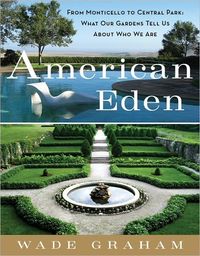

Purchase
From Monticello to Central Park to Our Backyards: What Our Gardens Tell Us About Who We Are
HarperCollins
April 2011
On Sale: April 5, 2011
480 pages
ISBN: 0061583421
EAN: 9780061583421
Hardcover
Add to Wish List
Non-Fiction
The story of our nation and ourselves—as told through
our country's most significant gardens and their creators From Frederick Law Olmsted to Richard Neutra, Michelle Obama
to our neighbors, Americans throughout history have revealed
something of themselves—their personalities, desires, and
beliefs—in the gardens they create. Rooted in the time and
place of their making, as much as in the minds and
identities of their makers, gardens mirror the struggles and
energies of a changing society. Melding biography, history,
and cultural commentary in a one-of-a-kind narrative,
American Eden presents a dynamic, sweeping look at this
country's landscapes and the visionaries behind them. Monticello's gardens helped Jefferson reconcile his
conflicted feelings about slavery—and take his mind off his
increasing debt. Edith Wharton's gardens made her feel more
European and superior to her wealthy but insufficiently
sophisticated countrymen. Martha Stewart's how-to
instructions helped bring Americans back into their gardens,
while at the same time stoking and exploiting our anxieties
about social class. Isamu Noguchi's and Robert Smithson's
experiments reinvigorated the age-old exchange between art
and the garden. American Eden offers an inclusive definition of the garden,
considering intentional landscapes that range from domestic
kitchen gardens to city parks and national parks, suburban
backyards and golf courses, public plazas and Manhattan's
High Line park, reclaimed from freight train tracks. And it
exposes the overlap between garden-making and painting,
literature, and especially architecture—the garden's
inseparable sibling—to reveal the deep interconnections
between the arts and their most inspired practitioners. Moving deftly through time and place across America's
diverse landscapes—from Revolutionary-era Virginia to
turn-of-the-century Chicago to 1960s suburban California—and
featuring a diverse cast of landscape-makers—whether
artists, architects, or housewives, amateurs or
professionals, robber barons, politicians, reformers, or
dreamers—Wade Graham vividly unfolds the larger cultural
history through more personal dramas. Beautifully illustrated with color and black-and-white
images, American Eden is at once a different kind of garden
book and a different kind of American history, one that
offers a compelling, untold story—a saga that mirrors and
illuminates our nation's invention, and constant
reinvention, of itself.
Comments
No comments posted.
Registered users may leave comments.
Log in or register now!
| 


 © 2003-2025 off-the-edge.net
all rights reserved Privacy Policy
© 2003-2025 off-the-edge.net
all rights reserved Privacy Policy